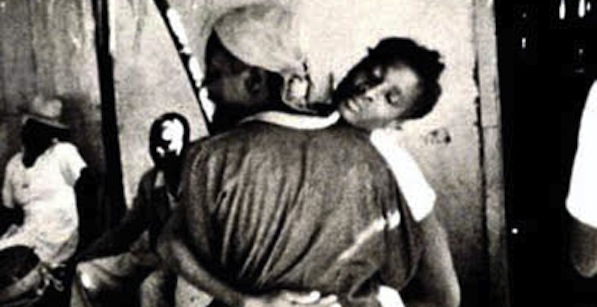I usually get a nostalgic kick out of David Brooks’ op-ed pieces in The New York Times; reading them is like getting back the warm glow of suburban Sunday school, where you were told that if you live decently and practically then both material and spiritual wealth would be yours. But then came along what he had to say about the Haiti earthquake, and what’s best to rebuild that devastated nation:
Haiti, like most of the world’s poorest nations, suffers from a complex web of progress-resistant cultural influences. There is the influence of the voodoo religion, which spreads the message that life is capricious and planning futile. There are high levels of social mistrust. Responsibility is often not internalized. Child-rearing practices often involve neglect in the early years and harsh retribution when kids hit 9 or 10.
We’re all supposed to politely respect each other’s cultures. But some cultures are more progress-resistant than others, and a horrible tragedy was just exacerbated by one of them.
These comments created a stir among both economists and left-wing social theorists, ranging from civil (see the egghead discussion at the Library of Economics and Liberty) to ruthless (Matt Taibi’s outrageous “translation” of Brooks. Consistently there was the cry against Brooks for “blaming the victim.” Yifat Susskind lashed back at Brooks’ suggestion that Haitian culture needs to be fixed with the help of outside intervention:
Ironically, Brooks’ prescription of “intrusive paternalism” to “fix the culture,” aptly sums up US policy towards Haiti for the past 100 years: a brutal military occupation from 1915 to 1934; support for dictatorship from 1957 to 1986; and more recently, the imposition of trade policies that have further impoverished people. What the outside world needs to “fix” is not Haitian culture, but its own self-serving policies that have left thousands of Haitians literally buried alive.
Others took umbrage at Brooks’ invoking of the voodoo religion as a cause for Haiti’s supposed backwardness. The UN Dispatch asserts that “Haitian Vodu is actually a monotheistic religion with an emphasis on supporting ones community and helping the poor.” This open letter directed at Brooks takes it further:
If Vodoun or “the voodoo religion” as you put it, “spreads the message that life is capricious and planning futile,” how do the majority of Haitians manage to survive on scant resources and less than two dollars-a-day? How do so many Haitians manage to travel abroad, find and maintain difficult jobs, and send money back home if not through careful planning and a fierce defense of precious life? How do the nationwide customers of Fonkoze, the Haitian banking operation that teaches literacy and business practices to curbside marketers to whom it makes small loans, achieve such strong records of loan repayment? In fact, it might be Haitian culture itself (and even Vodoun) which allows Haitians to persist.
Voodoo (or Vodou as it’s properly referred to in Haiti) certainly gets a bad rap in the Western vernacular, summoning notions of superstition, voodoo dolls and whatnot. One of the first people to give study the Haitian vodou religion, both in word and on film, was avant garde artist Maya Deren. A groundbreaking experimental filmmaker for her works Meshes in the Afternoon and At Land, she dedicated nearly a decade studying Vodou, receiving a Guggenheim Fellowship and spending 18 months in Haiti over three trips. She shot nearly 20,000 feet of footage, but somehow was unable to bring it into a form that she felt captured the essence of the ritual. She passed away in 1961 of a cerebral hemorrhage, though no less a figure than Stan Brakhage went on record as suspecting that her death was tied to her association with the occult.
Deren’s widower Teiji Ito and his second wife Cherel Winnett went on to edit the footage into Divine Horseman: The Living Gods of Haiti. Watching it, you really get a sense of how immersed Deren was among the Vodou worshippers, capturing virtually every detail of their rites. It was this degree of immersion, as well as Deren’s background as an artist rather than an anthropologist, that prevented her work from receiving recognition and support from academic circles – even though this footage, for all its intimacy of detail and historical authenticity, has proven invaluable to researchers today. It’s an intimacy you certainly don’t get from reading David Brooks – but watch it for yourself to see what you think of Vodou.
More resources:
Review of Divine Horsemen by Maya Deren scholar Moira Sullivan
Notes on Deren’s Haiti footage by Sullivan
Maya Deren Forum
“Dancing in the White Darkness” – Essay on Deren’s work with Vodou by the Tate Museum online
“Towards Embodied Knowledge?” – essay by Ilona Hongisto




